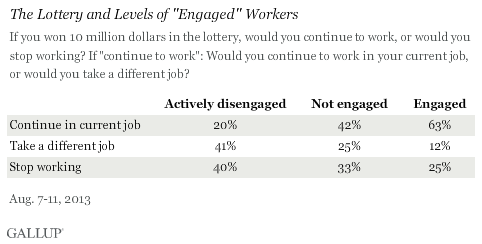WASHINGTON, D.C. -- The $648 million Mega Millions jackpot this week had many Americans dreaming about how their lives would change if they had won. For U.S. workers whom Gallup classifies as "engaged" in their jobs, these dreams do not include quitting them. Nearly two-thirds say they would continue to work in their current job if they won a $10 million lottery prize.

Workers Value Great Workplaces Over Riches
This commitment is unique among engaged workers, whom Gallup defines as involved in and enthusiastic about their work and their workplace. Less than half of those who do not have the same level of engagement with their workplace would keep their same job. Forty-two percent of U.S. workers categorized as "not engaged" with their workplaces and 20% of "actively disengaged" workers say they would continue to work in their current job upon winning $10 million in the lottery.
Although winning a multimillion-dollar lottery is an extreme circumstance with a low probability of occurring for any individual worker, these results highlight the value engaged employees place on having and keeping their good job -- even when it is no longer financially necessary.
Majorities of all workers indicate they would continue working after winning such an enormous prize. The major difference among the groups of workers is in the percentages saying they would continue to work in their current job versus taking a different job -- perhaps reflecting a broad understanding that working has benefits that go beyond a paycheck.
U.S. workers who are not engaged or are actively disengaged are emotionally disconnected from their workplaces and less likely to be productive. They tend to go to work in their current workplace merely for a paycheck without any sense of emotional compensation.
Implications
Extensive Gallup research shows that when employees are engaged they are less likely to leave their employer. This poll reinforces the high value people place on a good career. Even when provided with a hypothetical scenario that would provide financial security for life, those who are engaged at work are much more likely than less engaged workers to say they would continue in the same job.
As highlighted in Gallup's State of the American Workplace report, business units or work teams with high levels of employee engagement have less turnover than business units or work teams with low employee engagement: 65% less turnover if they are in an industry with low turnover and 25% less turnover if they are in an industry with high turnover.
Regardless of income level, a thriving career is important to achieving thriving overall well-being. Engaging work and a thriving career provide individuals with a source of identity, purpose, and satisfaction that money alone may not replace.
Survey Methods
Results for this Gallup poll are based on telephone interviews conducted Aug. 7-11, 2013, with a random sample of 1,002 adults, aged 18 and older, living in all 50 U.S. states and the District of Columbia.
For results based on the total sample of national adults, the margin of sampling error is ±4 percentage points at the 95% confidence level.
Interviews are conducted with respondents on landline telephones and cellular phones, with interviews conducted in Spanish for respondents who are primarily Spanish-speaking. Each sample of national adults includes a minimum quota of 50% cellphone respondents and 50% landline respondents, with additional minimum quotas by region. Landline and cell telephone numbers are selected using random-digit-dial methods. Landline respondents are chosen at random within each household on the basis of which member had the most recent birthday.
Samples are weighted to correct for unequal selection probability, nonresponse, and double coverage of landline and cell users in the two sampling frames. They are also weighted to match the national demographics of gender, age, race, Hispanic ethnicity, education, region, population density, and phone status (cellphone only/landline only/both, and cellphone mostly). Demographic weighting targets are based on the March 2012 Current Population Survey figures for the aged 18 and older U.S. population. Phone status targets are based on the July-December 2011 National Health Interview Survey. Population density targets are based on the 2010 census. All reported margins of sampling error include the computed design effects for weighting.
In addition to sampling error, question wording and practical difficulties in conducting surveys can introduce error or bias into the findings of public opinion polls.
For more details on Gallup's polling methodology, visit www.gallup.com.
